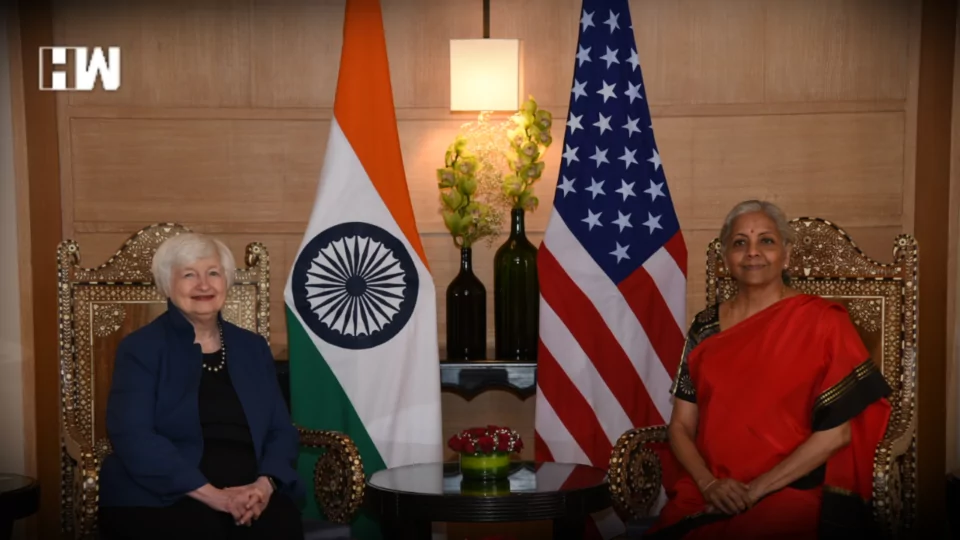Ahead of India’s G20 Presidency which is set to begin on December 1, US Treasury Secretary, Janet Yellen on Friday said that New Delhi is a “natural ally” and stressed that India’s G20 year is a chance to accelerate global coordination on debt restructuring.
Noida: Ahead of India’s G20 Presidency which is set to begin on December 1, US Treasury Secretary, Janet Yellen on Friday said that New Delhi is a “natural ally” and stressed that India’s G20 year is a chance to accelerate global coordination on debt restructuring.
Highlighting the growth in US-India economic ties, she said, “The US and India are ‘natural allies,’ in the words of a former Indian prime minister. We may be located across the world from each other, but what unites us is far greater than any of our differences. Our fights for independence were born of the same desire for freedom and dignity.”
Talking about India’s G20 Presidency, she said, “In three weeks, India will assume the helm of the G20 at an uncertain time for the global economy. We look forward to supporting India’s G20 presidency. A successful Indian presidency is indispensable to our global economic recovery and sustained progress on our deepest problems. The G20 must do better to provide debt relief where necessary. India’s G20 year is a chance to accelerate global coordination on debt restructuring,” said Yellen.
She also emphasized Common Framework for debt restructuring has not delivered its promise because of a lack of cooperation from China at G20.
“Two years ago, the G20 established the Common Framework to bring all the major bilateral creditors together to coordinate timely and orderly debt relief for low-income countries. But the Common Framework has not delivered on its promise, largely because of a lack of cooperation from China. As a consequence, debtor countries in need are hesitant to request Common Framework treatment.
This needs to change. All major bilateral creditors, including China, must cooperate constructively to deliver on their G20 commitment to provide meaningful debt relief. We must also improve the speed and predictability of the Common Framework itself”, she added.
Further in her remarks she also hailed India’s digital revolution and said that the digital economy provides massive opportunity and continues to drive economic growth.
“The digital revolution has changed the face of communication and commerce in our countries over the past three decades. Today, the digital economy provides massive opportunities and continues to drive economic growth. This is particularly true in India, which has over 560 million Internet subscribers and 1.2 billion mobile phone subscribers.
Rapid digital adoption has enabled India to achieve stunning success in its financial inclusion efforts. Nearly 500 million new bank accounts have been opened in India over the past eight years”, said the US Treasury Secretary.
“It is also clear that economic integration in the 21st century requires a modern international payments system. Cross-border payments should be cheaper than they are today. They should also be faster, more transparent, and easier to access. The G20 has set out a roadmap for enhancing cross-border payments.
We look forward to working with India to deliver tangible outcomes. This includes reducing friction to the flow of data. We also look forward to the G20 advancing financial inclusion efforts for the unbanked around the world”, she added.
Speaking about US companies moving their business operations – be it back-office, manufacturing, or R&D, to “friendly” countries, Yellen emphasized supply chains and deepening global integration with trusted partners like ‘India’ and said that the US is pursuing an approach called ” friendshoring.”
“The United States is pursuing an approach called ‘friendshoring’ to diversify away from countries that present geopolitical and security risks to our supply chain. To do so, we are proactively deepening economic integration with trusted trading partners like India. Our strategy will also create redundancies in our supply chain to mitigate over-concentration risks.
And we are also addressing our reliance on manufacturers whose approaches clash with our human rights values. To be very clear, ‘friendshoring’ is not limited to an exclusive club of countries. We seek integration with the large group of countries that we can count on – developing countries and advanced economies alike. In fact, part of our ‘friendshoring’ approach involves partnering with developing countries to grow local industries and connect them to the global supply chain.
Also Read: PM Modi Unveils 108-Feet High Bronze Statue Of Bengaluru Founder Nadaprabhu Kempegowda
She gave the example of a development finance institution, America’s largest solar manufacturer which is providing USD 500 million in debt financing to build a facility in Tamil Nadu in India.
“This facility will boost India’s solar manufacturing capacity. At the same time, it will help diversify supply chains away from China, which currently dominates over 80 per cent of global solar panel production”, she added.
“We are already seeing progress. New supply chains are developing across regions from Asia to the European Union. We are also seeing signs that Western firms are diversifying their supply chains beyond China. Technology companies like Amazon and Google are investing in India and Vietnam. Apple recently announced that it was shifting some iPhone manufacturing from China to India” said the Secretary.
Secretary Yellen is on her India visit and will then travel to Bali, Indonesia to represent the United States at the G20 Joint Finance and Health Ministers’ Meeting on November 12 and accompany President Joe Biden at the G20 Leaders’ Summit on November 15 and 16.
(Except for the headline, this story has not been edited by HW News staff and is published from a syndicated feed.)
As an independent media platform, we do not take advertisements from governments and corporate houses. It is you, our readers, who have supported us on our journey to do honest and unbiased journalism. Please contribute, so that we can continue to do the same in future.

